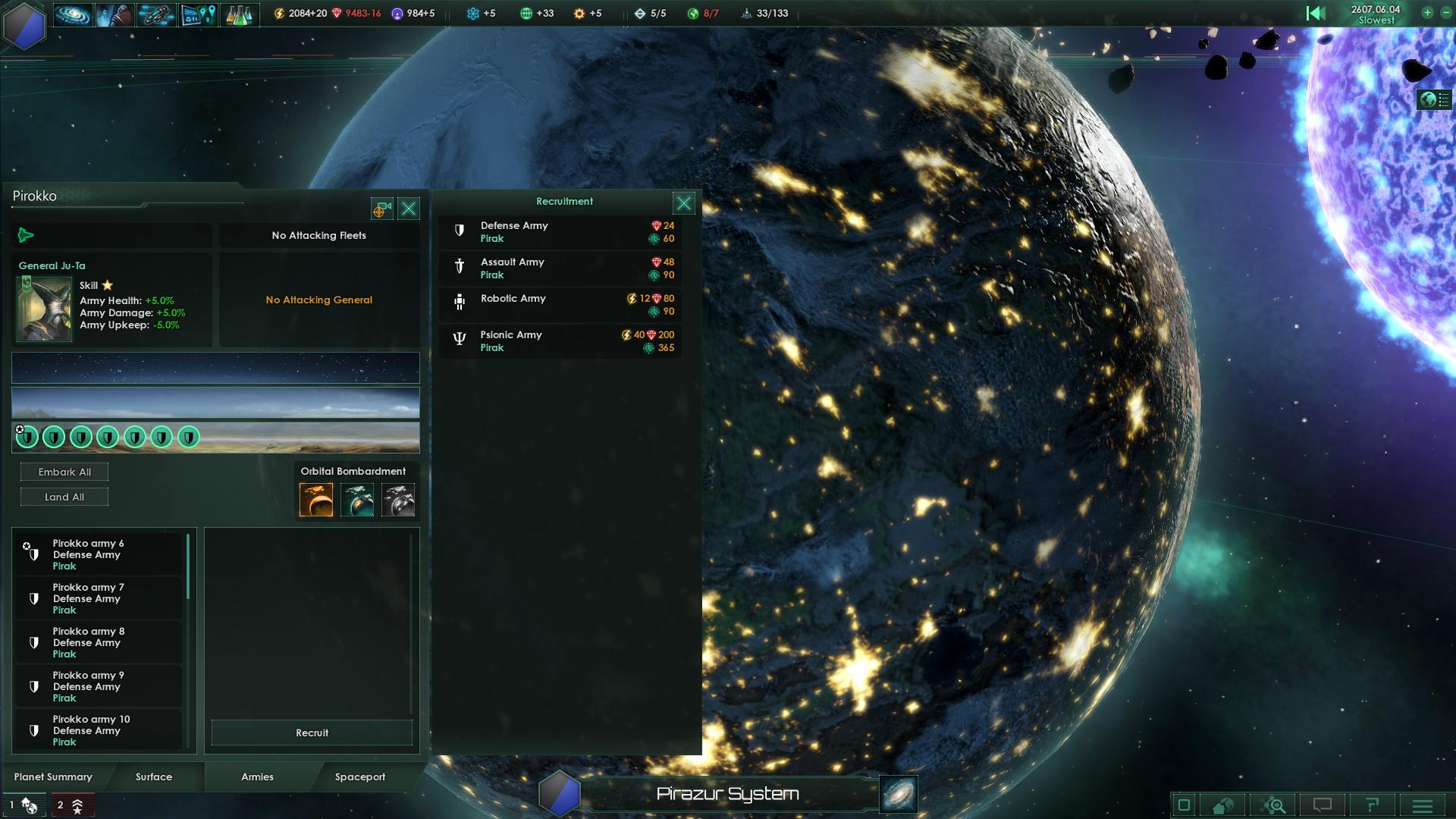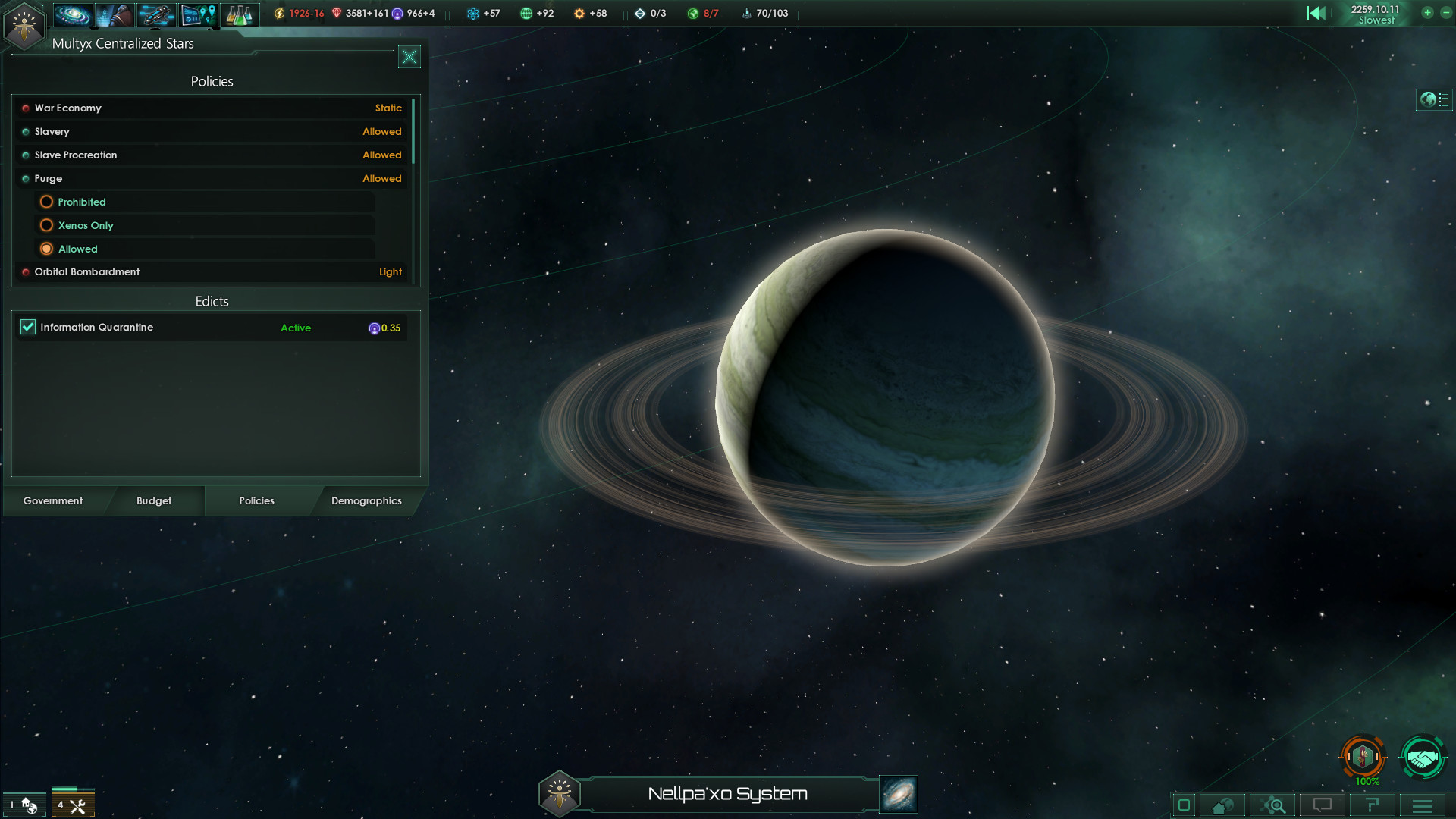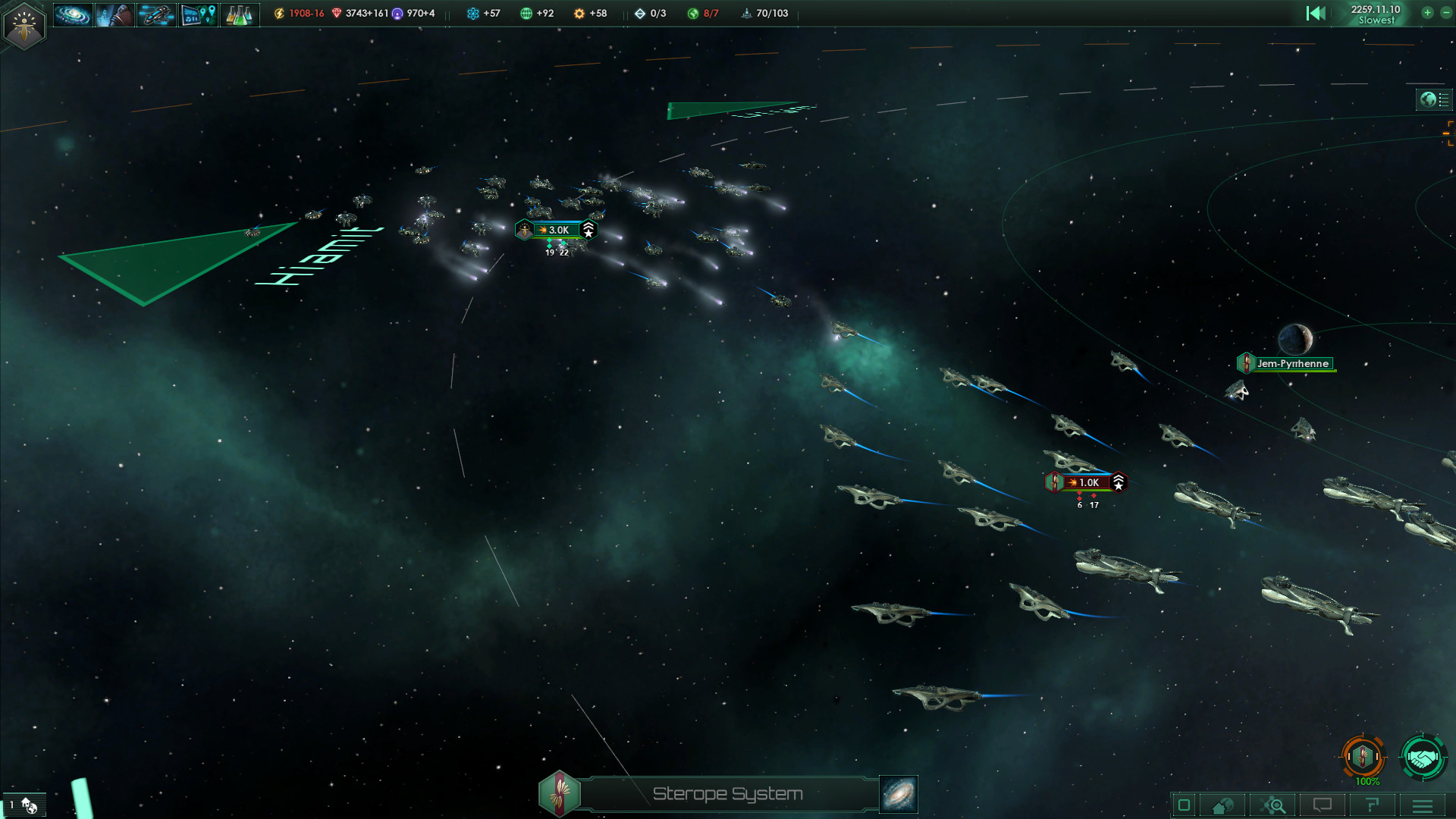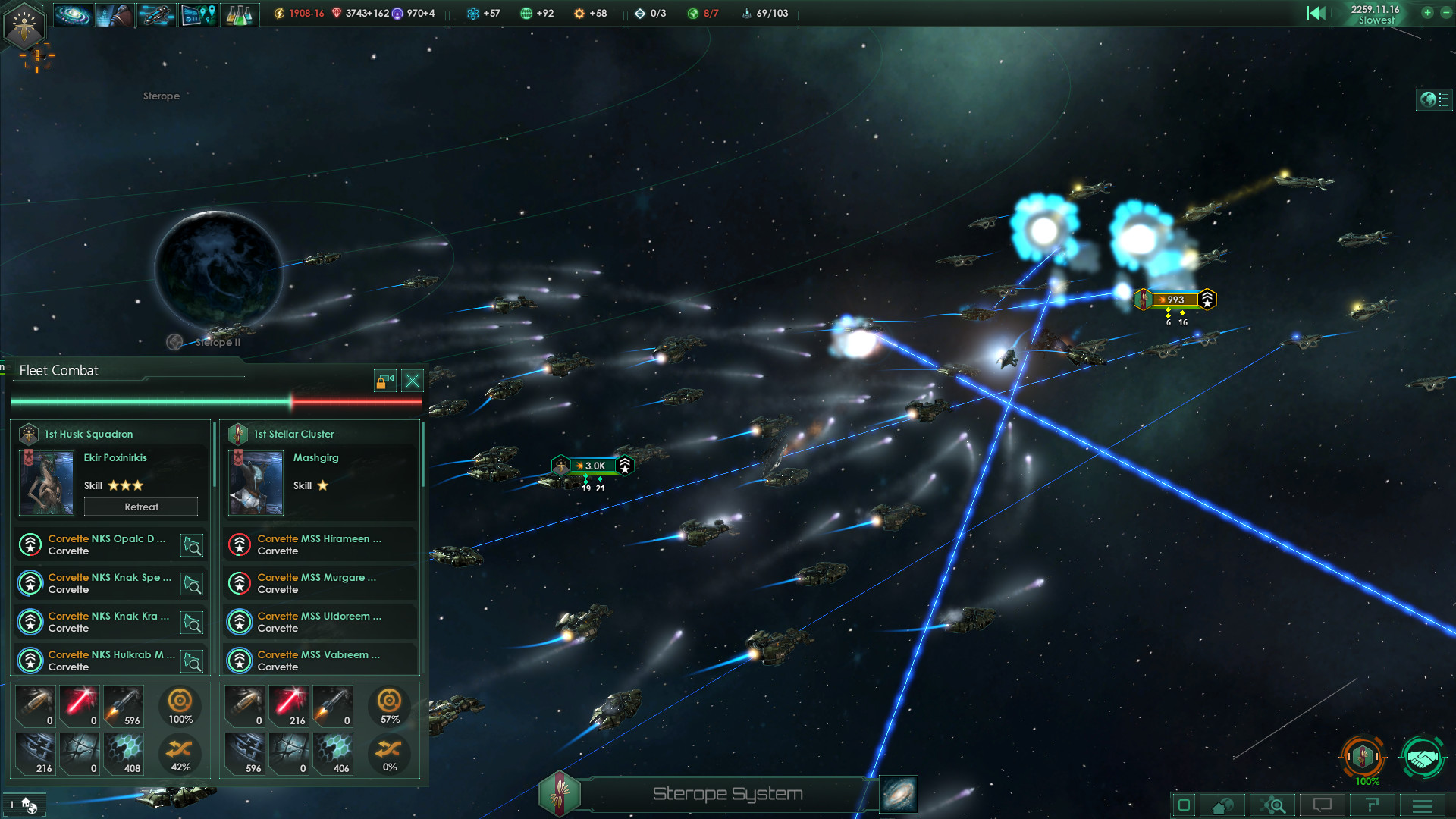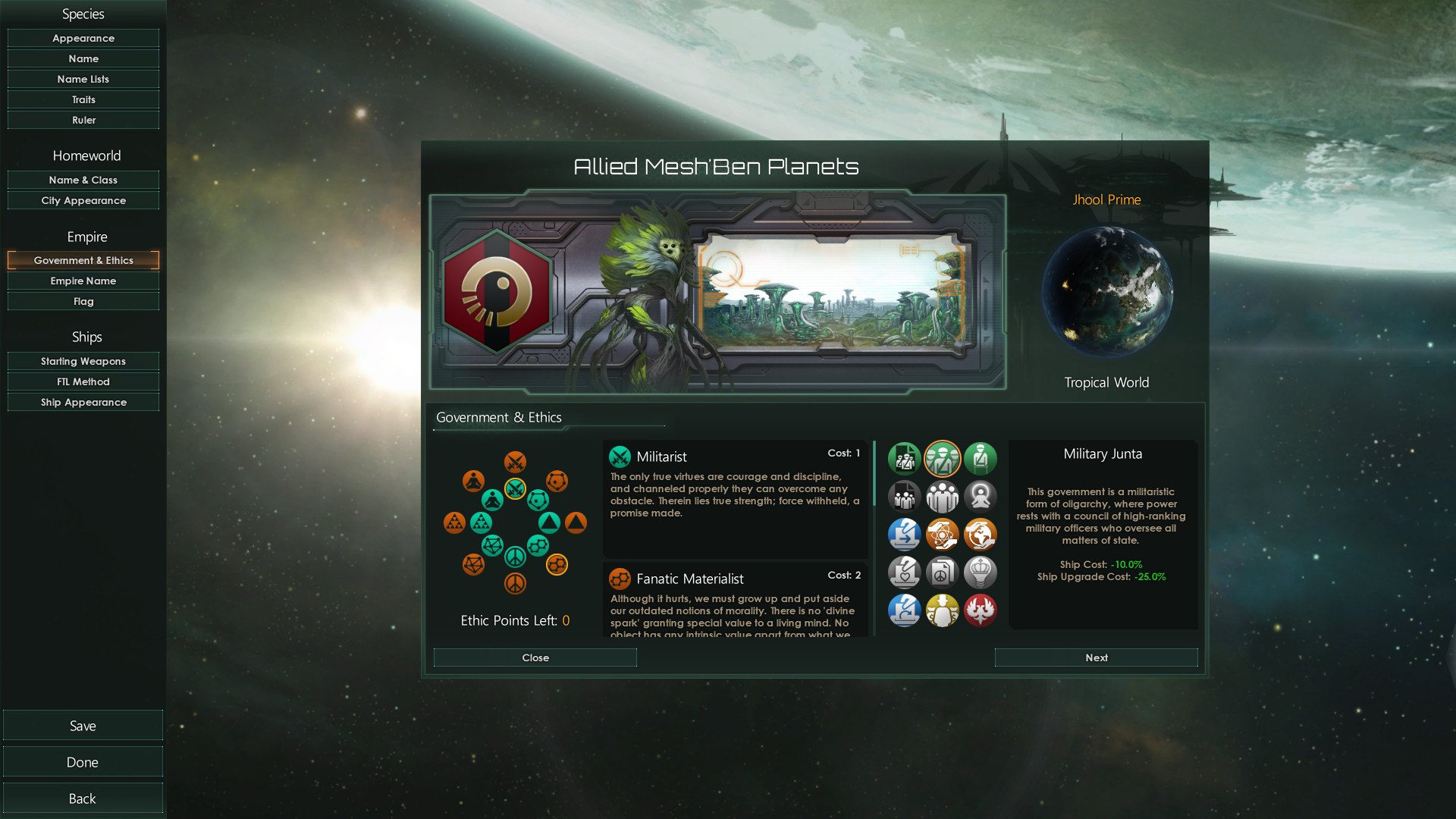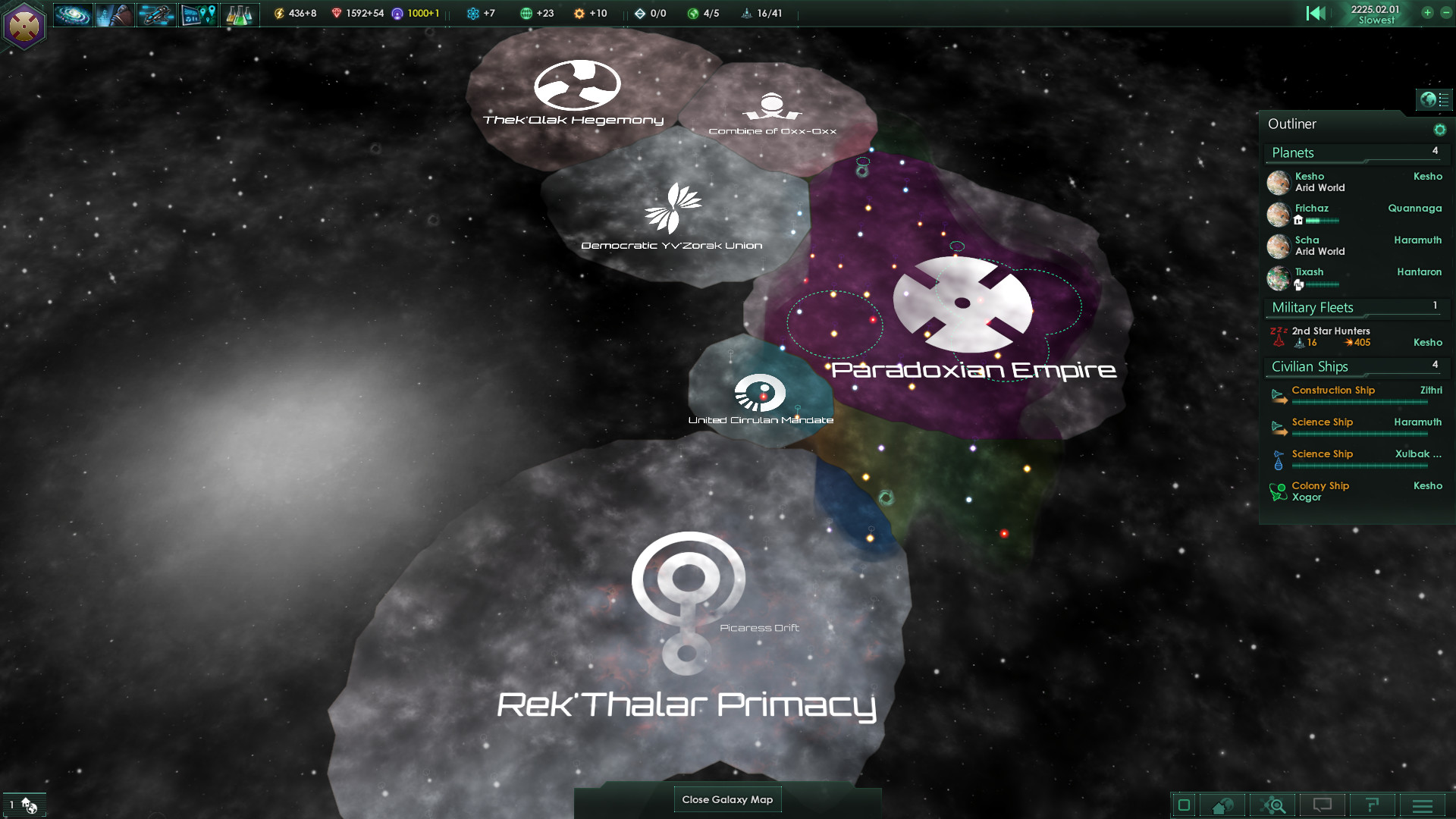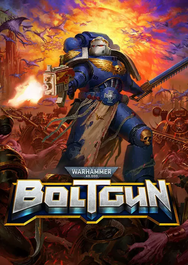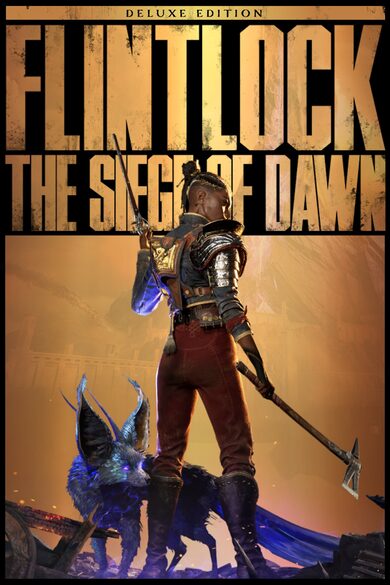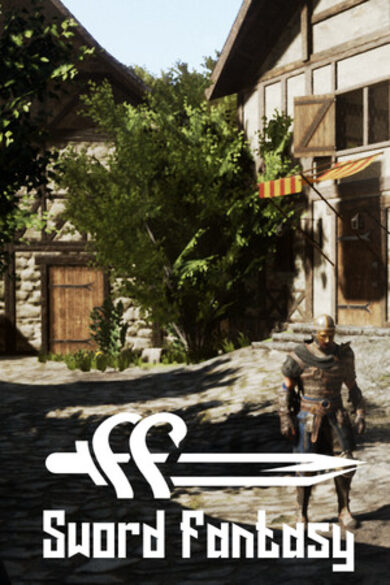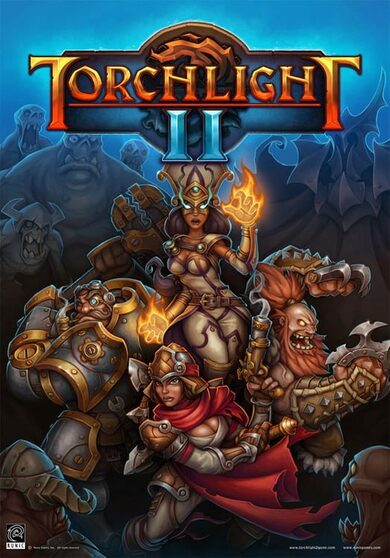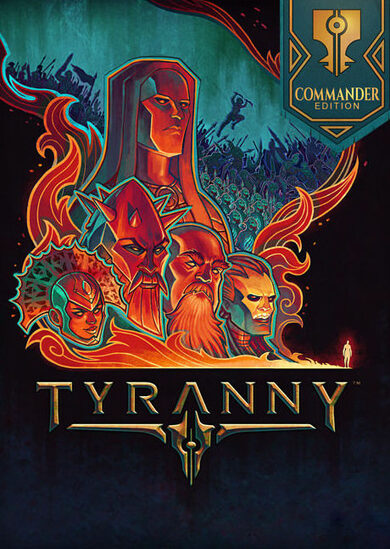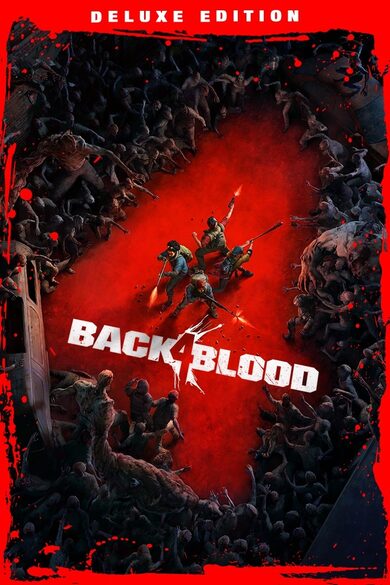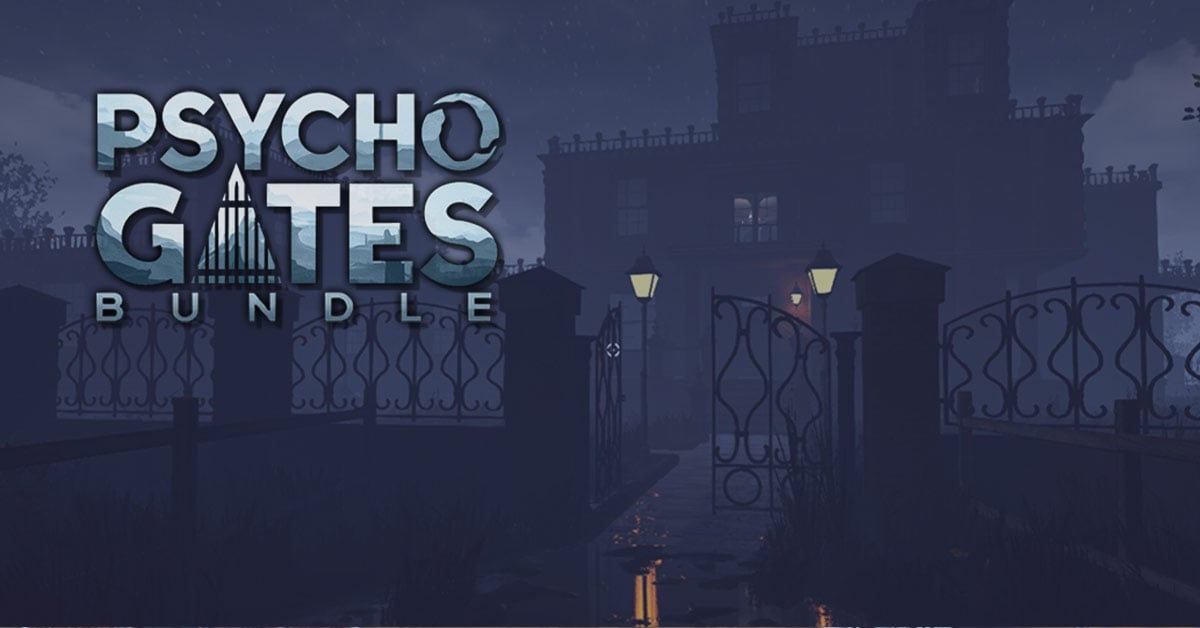Explore a vast galaxy full of wonder! Paradox Development Studio, makers of the Crusader Kings and Europa Universalis series presents Stellaris, an evolution of the grand strategy genre with space exploration at its core.
Featuring deep strategic gameplay, a rich and enormously diverse selection of alien races and emergent storytelling, Stellaris has engaging challenging gameplay that rewards interstellar exploration as you traverse, discover, interact and learn more about the multitude of species you will encounter during your travels.
Etch your name across the cosmos by forging a galactic empire; colonizing remote planets and integrating alien civilizations. Will you expand through war alone or walk the path of diplomacy to achieve your goals?
Main Feature
Featuring deep strategic gameplay, a rich and enormously diverse selection of alien races and emergent storytelling, Stellaris has engaging challenging gameplay that rewards interstellar exploration as you traverse, discover, interact and learn more about the multitude of species you will encounter during your travels.
Etch your name across the cosmos by forging a galactic empire; colonizing remote planets and integrating alien civilizations. Will you expand through war alone or walk the path of diplomacy to achieve your goals?
Main Feature
- Deep & Varied Exploration.
- Enormous procedural galaxies, containing thousands of planets.
- Explore Anomalies with your heroic Scientist leaders.
- Infinitely varied races through customization and procedural generation.
- Advanced Diplomacy system worthy of a Grand Strategy Game.
- Ship Designer based on a vast array of technologies.
- Stunning space visuals.
Stellaris Dev Diary #370 - 4.0 Changes Part 4
Our primary desire with these changes is to improve late-game performance, but while working on it we took the opportunity to streamline some aspects of planetary management and improve the planet UI.
Lets take a closer look at some of the details.
With the 4.0 Phoenix update, were making a subtle but important change - Pops will now generate Workforce, which is used to fill Jobs, and planets themselves will produce resources.
At a basic level, this works almost the same way. By default, every Pop generates 1 Workforce, so Jobs are still filled at the same rate. However, this shift is crucial for backend performance improvements, reducing the number of calculations the game needs to make each month.
Example: Then vs. Now
Before (3.14):
Now (4.0): If 100 Workforce still produces 6 Alloys, the planet still produces 612 Alloys - same output, different system. [/list]
Why This Matters:
The key benefit is efficiency. Instead of iterating through and calculating production for every individual Pop, the game now only checks once per planet. This makes the system more scalable and improves performance, while still allowing for species based bonuses and modifiers.
Most existing species traits that affect Job production will be converted into Workforce bonuses or planet-based modifiers. As always, the final balancing will be refined through the Open Beta.
There are a few quirks and subtleties about how this interacts with other modifiers - bonus Workforce as a modifier is more powerful than bonus Production due to the two of them stacking multiplicatively rather than additively.
Pop groups are currently split up by Species, Strata, Ethics, and Faction. If you end up in a case where a Pop group is not completely uniform (for example, if 20% of the Pop group are recent refugees and thus happier than the rest), then the differences get averaged across the Pop group.
If none of this feels like it makes sense - its okay. Its mostly a behind-the-scenes change. Jobs require Workforce to fill them, and thats generated by Pops. We have some ideas about ways to expand upon this in the future, such as replacing part of the Workforce with automation by using a building.
This results in several benefits, including multi-species empires not getting their growth dominated by underrepresented species, and also lets us remove the floor on colony Pop growth. This does mean that newly settled colonies will be very reliant on migration to grow their population until they develop to the point where they can support their own Pop growth, and removes a long-running issue where spamming colonies regardless of habitability simply for the minimum flat Pop growth was optimal.
Xeno-Compatibility will pool all species on a multi-species planet together to calculate their growth rate, then split the growth proportionally across the various species.
Assembly works largely the way it did before, except that fractional Assembly will become microPops thanks to the finer resolution of Pops. Machine and Organic Assembly will no longer conflict with one another, as the Organic Pops will handle their own growth, while all mechanical assembly will be channeled towards the highest score mechanical Pop templates available.
Spoiler: More Technical Details
[spoiler]
This is mostly for you modders out there to abuse, but in the new system, Unemployed Specialist will technically be a Job - therell be one for each stratum. Every Job can have a demotion target assigned to it, and a time.
In our implementation, all of the Specialist stratum Jobs will demote to Unemployed Specialist; Unemployed Specialist will demote to Unemployed Worker, and Unemployed Worker will demote to Civilian as they give up on their dreams of productivity and veg out in front of the holoscreen.[/spoiler]
Your homeworld will start with a fairly large pool of Civilians to support your early expansion. Were a bit worried about early conquest of homeworlds being too easy of a snowball with this increased starting Pop count, so are considering various ways of making it more challenging to take homeworlds in the early to mid game. One idea we have includes having Civilians create impromptu defensive militias to help defend their home, and possibly starting you off with a few Defensive Platforms. Another idea is for aggressively invaded Civilians to take Resistance Jobs that they must then demote out of over time. The number of Civilians converted to this new Job and how long it takes them to drop out of it would be modified depending on how their people are being treated by their new and old masters.
We welcome your ideas and suggestions.
Were also renaming the Ruler stratum to Elites, so Ruler isnt double-dipping between your Empires ruler at the top economic stratum.

by Eladrin
Hello everyone!
This week were going to look at the upcoming changes to Pops in the Stellaris 4.0 Phoenix update.
Last week I said we might also look at the Planet UI, but Im going to save that until next week since theres quite a bit to cover here (especially if youre into the technical details), and Id rather not split the feedback.
Pop Groups and Workforce
As mentioned in Dev Diary 366 , the Pop and Jobs system introduced in Stellaris 2.2 Le Guin has always had significant performance implications in the late game, and weve been working on incremental improvements ever since. In the Stellaris 4.0 Phoenix update, Pops will be grouped into Pop Groups based on species, strata, ethics, and faction, and these Pop Groups will produce Workforce that is used to fill (or partially fill) Jobs. As part of this change, were changing the overall scale of Pops - most things that previously affected or manipulated 1 Pop would now affect or manipulate groups of 100. The new systems can manipulate any number of Pops within a Pop Group just as easily as manipulating one, and Ill go into some of the benefits of the finer resolution below.Our primary desire with these changes is to improve late-game performance, but while working on it we took the opportunity to streamline some aspects of planetary management and improve the planet UI.
Lets take a closer look at some of the details.
Workforce
In Stellaris, the core economic loop since 2.2 has been: Pops fill Jobs, and Jobs produce resources.With the 4.0 Phoenix update, were making a subtle but important change - Pops will now generate Workforce, which is used to fill Jobs, and planets themselves will produce resources.
At a basic level, this works almost the same way. By default, every Pop generates 1 Workforce, so Jobs are still filled at the same rate. However, this shift is crucial for backend performance improvements, reducing the number of calculations the game needs to make each month.
Example: Then vs. Now
Before (3.14):
- Take a planet with 100 Pops working Metallurgist Jobs, where 20 of them have a +10% Production Bonus from a Species Trait.
- These 100 Pops produce 612 Alloys per month.
- Every Pop is individually checked - 80 produce the standard amount, while 20 get a 10% Alloy production bonus from their species trait.
Now (4.0):
- Instead of tracking individual Pops, we track Workforce filling Jobs.
- Jobs are now filled by 10,000 Workforce (since Pops are scaled up by 100).
- 8,000 Workforce comes from regular Pops, while 2,000 Workforce comes from the bonus-earning Pops.
[list] - The species bonus is now 10% bonus Workforce when working Alloy jobs - those Pops contribute an extra 200 Workforce, making the total 10,200 Workforce. Bonus Workforce is allowed to go over the required Workforce for a job, yielding extra production.
Why This Matters:
The key benefit is efficiency. Instead of iterating through and calculating production for every individual Pop, the game now only checks once per planet. This makes the system more scalable and improves performance, while still allowing for species based bonuses and modifiers.
Most existing species traits that affect Job production will be converted into Workforce bonuses or planet-based modifiers. As always, the final balancing will be refined through the Open Beta.
There are a few quirks and subtleties about how this interacts with other modifiers - bonus Workforce as a modifier is more powerful than bonus Production due to the two of them stacking multiplicatively rather than additively.
Pop groups are currently split up by Species, Strata, Ethics, and Faction. If you end up in a case where a Pop group is not completely uniform (for example, if 20% of the Pop group are recent refugees and thus happier than the rest), then the differences get averaged across the Pop group.
If none of this feels like it makes sense - its okay. Its mostly a behind-the-scenes change. Jobs require Workforce to fill them, and thats generated by Pops. We have some ideas about ways to expand upon this in the future, such as replacing part of the Workforce with automation by using a building.
Pop Growth
With more granular Pop units, we have more ability to support simultaneous growth of Pops on a planet. Each species present on a planet will grow normally, and with the smaller unit size, will grow every month.This results in several benefits, including multi-species empires not getting their growth dominated by underrepresented species, and also lets us remove the floor on colony Pop growth. This does mean that newly settled colonies will be very reliant on migration to grow their population until they develop to the point where they can support their own Pop growth, and removes a long-running issue where spamming colonies regardless of habitability simply for the minimum flat Pop growth was optimal.
Xeno-Compatibility will pool all species on a multi-species planet together to calculate their growth rate, then split the growth proportionally across the various species.
Assembly works largely the way it did before, except that fractional Assembly will become microPops thanks to the finer resolution of Pops. Machine and Organic Assembly will no longer conflict with one another, as the Organic Pops will handle their own growth, while all mechanical assembly will be channeled towards the highest score mechanical Pop templates available.
Colonization and Civilians
Since your new colonies will be extremely reliant on migration from their homeworld until they reach a critical mass of inhabitants where they can begin to support themselves, were adding a new population stratum called Civilians (or Residents, for species without full citizenship). These Civilians form the generally content base of your empire, and will trickle out to the colonies, looking for better opportunities. Unemployed Pops will still exist and downgrade through the strata, with unemployed Worker stratum Pops demoting to Civilians over time. This will have an impact on stability, as Civilians are largely content and non-disruptive.Spoiler: More Technical Details
[spoiler]
This is mostly for you modders out there to abuse, but in the new system, Unemployed Specialist will technically be a Job - therell be one for each stratum. Every Job can have a demotion target assigned to it, and a time.
In our implementation, all of the Specialist stratum Jobs will demote to Unemployed Specialist; Unemployed Specialist will demote to Unemployed Worker, and Unemployed Worker will demote to Civilian as they give up on their dreams of productivity and veg out in front of the holoscreen.[/spoiler]
Your homeworld will start with a fairly large pool of Civilians to support your early expansion. Were a bit worried about early conquest of homeworlds being too easy of a snowball with this increased starting Pop count, so are considering various ways of making it more challenging to take homeworlds in the early to mid game. One idea we have includes having Civilians create impromptu defensive militias to help defend their home, and possibly starting you off with a few Defensive Platforms. Another idea is for aggressively invaded Civilians to take Resistance Jobs that they must then demote out of over time. The number of Civilians converted to this new Job and how long it takes them to drop out of it would be modified depending on how their people are being treated by their new and old masters.
We welcome your ideas and suggestions.
Clerks are dead! Long live Civilians!
Were currently still experimenting with the effects Living Standards have on Civilians (and Pops in general) - its likely that more of the Trade generation from Living Standards will be shifted to the Civilian stratum, and production from Unemployed Pops in the old system may also move to the Civilians. This will give them some of the functions of Clerks in the old economic model. In Gestalt empires, they are likely going to be outright named Maintenance Drones rather than Civilians.Were also renaming the Ruler stratum to Elites, so Ruler isnt double-dipping between your Empires ruler at the top economic stratum.
Next Week
Next week well be going through the new Planet UI, and how all of this changes things there.[ 2025-02-13 12:00:55 CET ] [Original Post]
Minimum Setup
- OS: Ubuntu 20.04 x64
- Processor: Intel iCore i3-530 or AMD FX-6350Memory: 4 GB RAM
- Memory: 4 GB RAM
- Graphics: Nvidia GeForce GTX 460 or AMD ATI Radeon HD 5870 (1GB VRAM). or AMD Radeon RX Vega 11 or Intel HD Graphics 4600Network: Broadband Internet connection
- Storage: 12 GB available space
Recommended Setup
- OS: Ubuntu 20.04 x64
- Processor: Intel iCore i5-3570K or AMD Ryzen 5 2400GMemory: 4 GB RAM
- Graphics: Nvidia GeForce GTX 560 Ti (1GB VRAM) or AMD Radeon R7 370 (2 GB VRAM)Network: Broadband Internet connection
- Storage: 12 GB available space
GAMEBILLET
[ 6365 ]
FANATICAL
[ 6572 ]
GAMERSGATE
[ 3185 ]
MacGameStore
[ 2507 ]
INDIEGALA
[ 1655 ]
LOADED
[ 1040 ]
ENEBA
[ 32822 ]
Green Man Gaming Deals
[ 882 ]
AllKeyShop
[ 45587 ]
YUPLAY
[ 6040 ]
FANATICAL BUNDLES
GMG BUNDLES
HUMBLE BUNDLES
INDIEGALA BUNDLES
by buying games/dlcs from affiliate links you are supporting tuxDB

